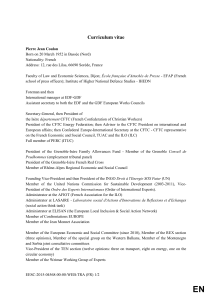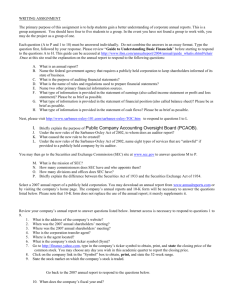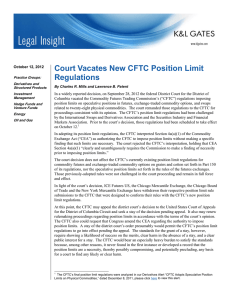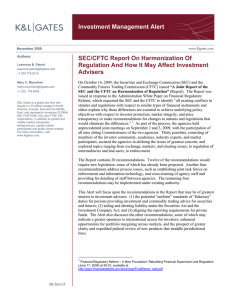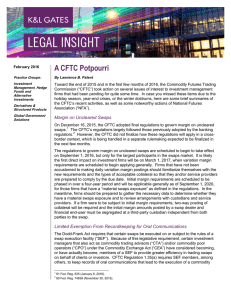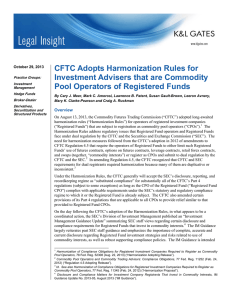The SEC and CFTC Recommend Significant Changes to the Regulatory
advertisement
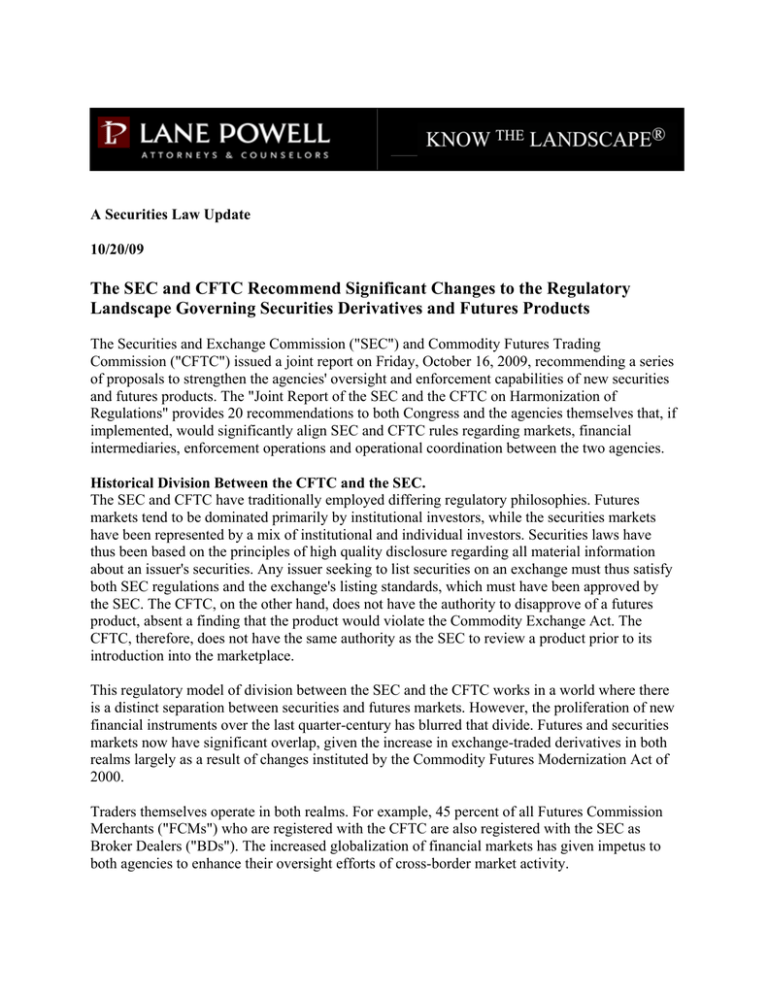
A Securities Law Update 10/20/09 The SEC and CFTC Recommend Significant Changes to the Regulatory Landscape Governing Securities Derivatives and Futures Products The Securities and Exchange Commission ("SEC") and Commodity Futures Trading Commission ("CFTC") issued a joint report on Friday, October 16, 2009, recommending a series of proposals to strengthen the agencies' oversight and enforcement capabilities of new securities and futures products. The "Joint Report of the SEC and the CFTC on Harmonization of Regulations" provides 20 recommendations to both Congress and the agencies themselves that, if implemented, would significantly align SEC and CFTC rules regarding markets, financial intermediaries, enforcement operations and operational coordination between the two agencies. Historical Division Between the CFTC and the SEC. The SEC and CFTC have traditionally employed differing regulatory philosophies. Futures markets tend to be dominated primarily by institutional investors, while the securities markets have been represented by a mix of institutional and individual investors. Securities laws have thus been based on the principles of high quality disclosure regarding all material information about an issuer's securities. Any issuer seeking to list securities on an exchange must thus satisfy both SEC regulations and the exchange's listing standards, which must have been approved by the SEC. The CFTC, on the other hand, does not have the authority to disapprove of a futures product, absent a finding that the product would violate the Commodity Exchange Act. The CFTC, therefore, does not have the same authority as the SEC to review a product prior to its introduction into the marketplace. This regulatory model of division between the SEC and the CFTC works in a world where there is a distinct separation between securities and futures markets. However, the proliferation of new financial instruments over the last quarter-century has blurred that divide. Futures and securities markets now have significant overlap, given the increase in exchange-traded derivatives in both realms largely as a result of changes instituted by the Commodity Futures Modernization Act of 2000. Traders themselves operate in both realms. For example, 45 percent of all Futures Commission Merchants ("FCMs") who are registered with the CFTC are also registered with the SEC as Broker Dealers ("BDs"). The increased globalization of financial markets has given impetus to both agencies to enhance their oversight efforts of cross-border market activity. Following the financial crisis of 2008, the Obama Administration outlined its plan for comprehensive financial reform and to restore confidence in the integrity of the financial system. As part of that effort, the Administration requested that both the SEC and CFTC identify conflicting statutory and regulatory constraints and provide a series of recommendations to eliminate those differences where necessary. After three months of public comment, the agencies' Joint Report is their answer to that request. Recommendations of the Joint Report. The Joint Report reviews the current statutory and regulatory structure in eight areas: product listing and approval; exchange/clearinghouse rule changes; risk-based portfolio margining and bankruptcy/insolvency regimes; linked national market and common clearing versus separate markets and exchange-directed clearing; price manipulation and insider trading; customer protection standards applicable to financial advisers; regulatory compliance by dual registrants; and cross-border regulatory issues. The Report concludes with a series of 20 recommendations for both Congress and the agencies themselves. Some of the key recommendations include the following: • • • • • • Legislation enabling both agencies with oversight of new financial instruments. Selfregulatory organizations ("SROs") would be authorized to hold futures products in securities portfolio margin accounts, and securities options and other securities derivatives could be held in futures portfolio accounts. Legislation providing a process for reviewing and early de-conflicting of jurisdictional matters between the two agencies. Currently there can be a delay when determining which agency has authority over a product exempted by the other agency. The Report recommends legislation to ensure that jurisdictional questions are resolved by both Commissions against a firm deadline. Rule changes among the SEC and CFTC to align record retention requirements for intermediaries by harmonizing the length of time that records are required to be maintained. Currently the SEC imposes three- and six-year retention requirements on intermediaries, while the CFTC imposes five-year retention requirements. The SEC will evaluate whether to adopt a uniform five-year requirement. Legislation empowering the CFTC to (1) have enhanced authority over exchange and clearinghouse compliance with the Commodities Exchange Act; and (2) require foreign boards of trade to register with the CFTC in order to enable the CFTC to oversee trading by United States entities offering futures abroad. Legislation imposing uniform fiduciary standards on intermediaries who provide similar investment advisory services regarding either futures or securities; and legislation to expand the CFTC's conflict of interest prevention, disruptive trading practices and insider trading authority to be commensurate with the SEC's similar authority. Legislation granting the SEC with specific enforcement authority for "aiding and abetting" liability under the Securities Act and Investment Company Act. The Report also provides several recommendations to enhance joint operational coordination between the CFTC and the SEC. 2 How the Joint Report Will Impact the Landscape. The Joint Report is a portent of things to come. It provides an early indication of how the regulatory landscape will appear regarding derivative financial instruments that have both futures and securities characteristics. While not all the recommendations of the Report will be adopted and those that are adopted will undergo substantial changes in the legislative and rule making processes - there is significant public support for regulatory reforms in the wake of last year's financial crisis. The recommendations in the Joint Report will thus have weight with Congress. If implemented, the Joint Report's recommendations would most significantly impact intermediaries, particularly independent broker-dealers and investment companies. But the recommendations will also affect issuers and underwriters who will have to comply with enhanced disclosure requirements and retention policies, and interface with both the CFTC and the SEC, given their impending broadened authority to regulate derivatives. For more information, please contact the Securities Litigation Practice Group or the Director and Officer Liability Law Practice Group at Lane Powell: 206.223.7000 Seattle 503.778.2100 Portland lanepowellpc@lanepowell.com www.lanepowell.com We provide the Securities Law Hotsheet as a service to our clients, colleagues and friends. It is intended to be a source of general information, not an opinion or legal advice on any specific situation, and does not create an attorney-client relationship with our readers. If you would like more information regarding whether we may assist you in any particular matter, please contact one of our lawyers, using care not to provide us any confidential information until we have notified you in writing that there are no conflicts of interest and that we have agreed to represent you on the specific matter that is the subject of your inquiry. Copyright © 2009 Lane Powell PC www.lanepowell.com Seattle - Portland - Anchorage - Olympia - Tacoma - London 3
